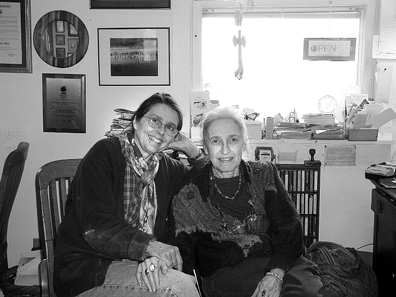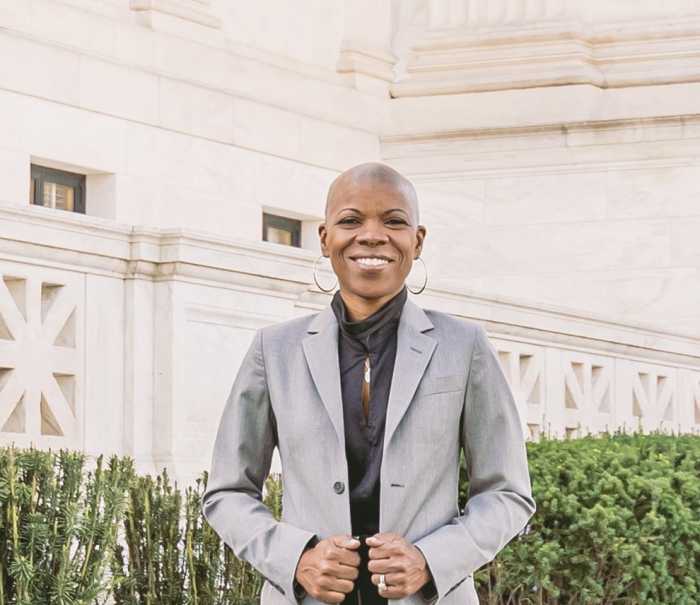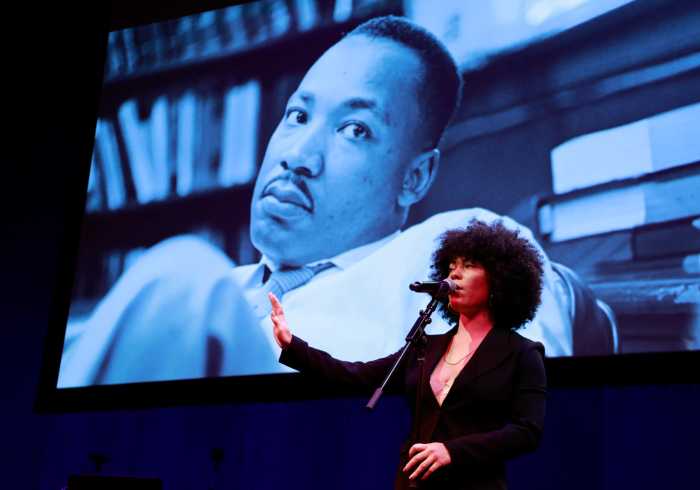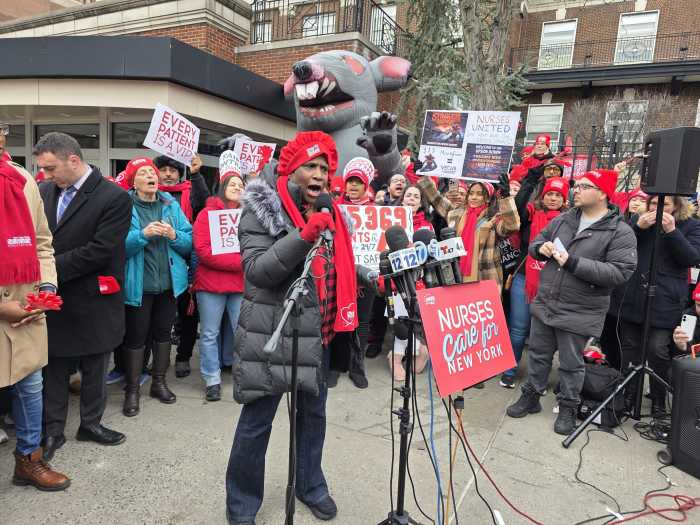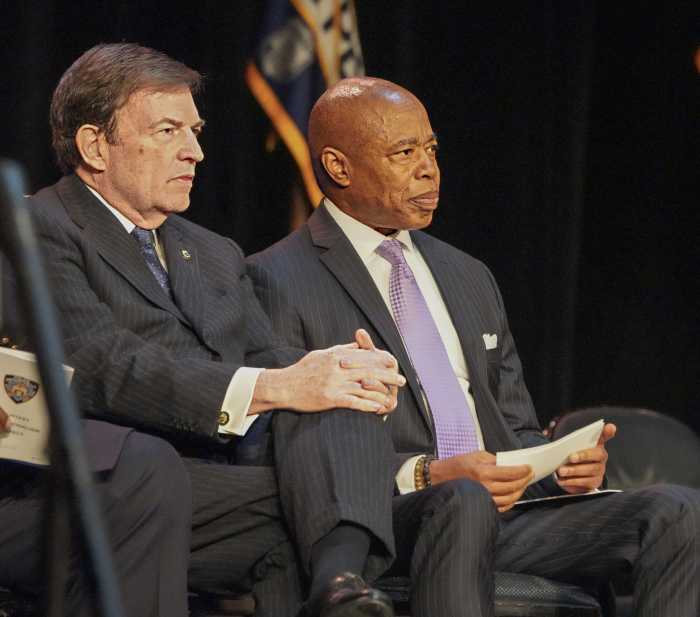Two Bridgeport, Connecticut, lesbians reflect on nearly three decades of a feminist space
Bloodroot, a restaurant and bookstore, is in Bridgeport, Connecticut, but for New Yorkers willing to make an afternoon or evening of it, this destination is one of the most inviting and healthy places for a vegetarian meal that is tasty and nutritious—and a visit also affords you the chance for a wonderfully thought-provoking conversation with women who have steered this effort as a collective for more than two decades.
I was fortunate to have an opportunity to meet with the two women who make up the collective, Selma Miriam and Noel Furie, right before the 28th anniversary celebration of Bloodroot’s founding in March.
Back in 1977, it was Miriam who came up with the idea of a Bloodroot collective, as a self-supporting place for women that would combine books and food. That was a relatively novel concept at the time, years before it took on a sanitized, corporate veneer in places such as Barnes and Noble.
The two women are not lovers, but sitting talking with them, I was struck by how much they sound like an old married couple. They finished each other’s sentences and each seemed rapt by stories the other told as if she were hearing them for the first time. They worked preparing dinner and the three of us talked.
The aromas escaping from the kitchen were a sensory delight and reminded me why I so often return to Bridgeport for a meal there. I sat in a room full of wooden tables and chairs, with windows looking out onto Long Island Sound and the remaining walls covered with photos of all kinds of women, from those taken very recently to others with a decidedly vintage look to them. Best of all was the palpable sensation of being in a room soaked with the talk, sweat, history and intimacy of women who loved food, horticulture, knitting, each other and a whole slew of other interests that bound them together.
Miriam has just turned 70 and is short and wiry. Furie is taller, darker, more muscular, and younger than Miriam. What impressed me about Miriam is the way she smiles. She doesn’t smile often, but when she does the room brightens and you feel held in her force field. Belying her small stature, her presence feels large and powerful.
Just prior to Bloodroot’s founding, Miriam was diagnosed with breast cancer. A doctor advised her to have a mastectomy but Miriam refused, more focused at that moment in making her dream of a collective a reality. She asked the doctor how long she might live without that radical form of treatment and he said three years. Miriam chose a different route and is here today as a sturdy repudiation of the kind of casual, poorly-informed prediction all too common from doctors dealing with women’s health.
Miriam focused her stories on the trials of launching the restaurant. Furie, in contrast, talked about how much time she focused on her community, with stories about years of political work she has done in her neighborhood in Bridgeport, a multi-ethnic, largely working class coastal city.
I asked the two women why they organized Bloodroot in the way they did, and they explained it in terms of a larger interest in the collective ownership movement, widespread in the late ‘70s but far less common today. They were both strongly committed to building and expanding on opportunities for a women-friendly life for themselves and others; Bloodroot was established by and for women to serve a variety of women’s needs.
In addition to the restaurant and bookstore, they run knitting classes as well as regular meetings of a homeopathy discussion group. They spoke to me of a wide range of women who have been a part of their effort over the years, including the woman architect who designed the building, the women who were part of the collective, but have since left––though most, they said, have not left behind what they learned there––and the kinds of mentoring they have done. To many women, particularly younger ones, they have imparted some of their business acumen, their cooking and baking skills and their devotion to the garden where they grow the fresh vegetables they use in their restaurant. They have also always emphasized their belief that there are rewards from living a women-centered life.
These two women have created an enterprise––I hesitate to call it an institution because that would deny it the kind of vitality it has––based on an enormous amount of dedication and thought that goes into all that one might experience there. The daily practice of self-sufficiency suffuses both women with an energy that they radiate.
Clearly, Miriam and Furie are nonconformists from the vantage point of mainstream American society, and the choices they have made would not be those everyone else would be comfortable with. Furie told a story of falling several years ago and knowing at once that she had broken her hip. Confirming her own knowledge of what had occurred in her body, she got an x-ray, but then retired to bed in terrible pain, rather than having a pin placed in her hip. For several weeks, she relied instead on homeopathic remedies, both for pain and for healing. When she was x-rayed again, she recalled, the doctors were amazed at how well the bone had mended. With exercise to restore her atrophied muscles, Furie completely healed.
Both women related their health stories by way of illustrating the confidence they have in themselves and their knowledge of themselves and their bodies. As vegetarians, they look at the way our culture treats women through the prism of how it treats animals. Their view of the need to build a culture of self-sufficiency respectful of the wider world around us reverberates through every decision they have made about the way they live their lives.
I like being in Bloodroot when it is filled with customers. The place is homey and tasteful. But beyond that, there are no waitresses or waiters; you are responsible for bussing your own table and for getting the coffee or tea you want with or after your meal. The air fills up with the soft buzzing of people talking to each other while they eat, the aroma of the foods that you pick up from the kitchen after you place your order with Miriam at the door. The place combines a wonderful efficiency with a nutritious outlook on life.
But what impresses me the most is the calm peacefulness I always leave there with. It is unlike any other restaurant experience I have had.
Bloodroot is located at 85 Ferris Street in Brideport and is open for lunch and dinner, Tuesday to Saturday, until 9 p.m., except until 10 p.m. on weekends. Brunch is served from 11:30 a.m. to 2:30 p.m. on Sunday. The phone number is 203-576-9168.
gaycitynews.com

